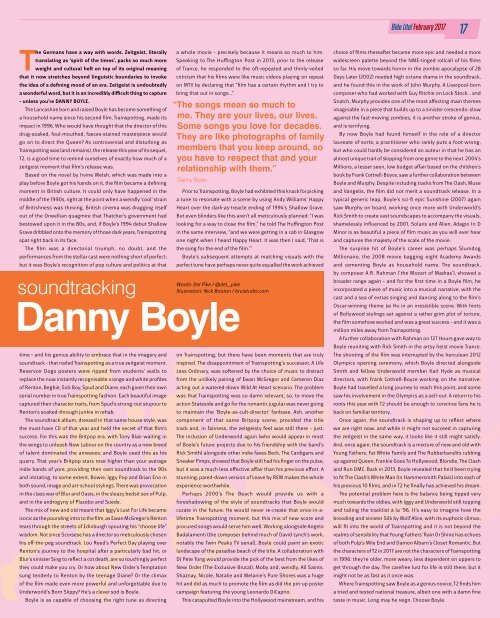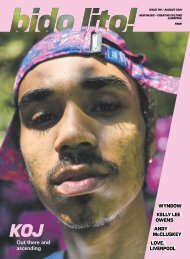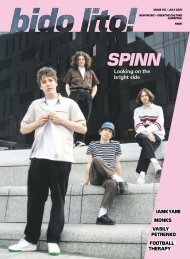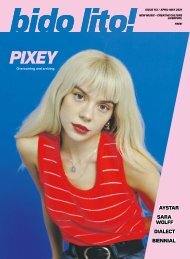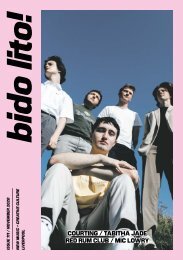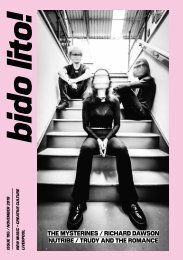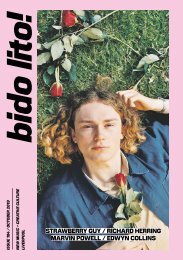Issue 74 / February 2017
February 2017 issue of Bido Lito! Featuring THE ORIELLES, OYA PAYA, NIK COLK VOID, DANNY BOYLE, THE LEMON TWIGS and much more.
February 2017 issue of Bido Lito! Featuring THE ORIELLES, OYA PAYA, NIK COLK VOID, DANNY BOYLE, THE LEMON TWIGS and much more.
Create successful ePaper yourself
Turn your PDF publications into a flip-book with our unique Google optimized e-Paper software.
Bido Lito! <strong>February</strong> <strong>2017</strong><br />
17<br />
The Germans have a way with words. Zeitgeist, literally<br />
translating as ‘spirit of the times’, packs so much more<br />
weight and cultural heft on top of its original meaning<br />
that it now stretches beyond linguistic boundaries to invoke<br />
the idea of a defining mood of an era. Zeitgeist is undoubtedly<br />
a wonderful word, but it is an incredibly difficult thing to capture<br />
– unless you’re DANNY BOYLE.<br />
The Lancashire born and raised Boyle has become something of<br />
a household name since his second film, Trainspotting, made its<br />
impact in 1996. Who would have thought that the director of this<br />
drug-soaked, foul-mouthed, faeces-stained masterpiece would<br />
go on to direct the Queen? As controversial and disturbing as<br />
Trainspotting was (and remains), the release this year of its sequel,<br />
T2, is a good time to remind ourselves of exactly how much of a<br />
zeitgeist moment that film’s release was.<br />
Based on the novel by Irvine Welsh, which was made into a<br />
play before Boyle got his hands on it, the film became a defining<br />
moment in British culture. It could only have happened in the<br />
middle of the 1990s, right at the point when a weirdly ‘cool’ strain<br />
of Britishness was thriving. British cinema was dragging itself<br />
out of the Orwellian quagmire that Thatcher’s government had<br />
bestowed upon it in the 80s, and, if Boyle’s 1994 debut Shallow<br />
Grave dribbled onto the memory of those dark years, Trainspotting<br />
spat right back in its face.<br />
The film was a directorial triumph, no doubt, and the<br />
performances from the stellar cast were nothing short of perfect;<br />
but it was Boyle’s recognition of pop culture and politics at that<br />
soundtracking<br />
a whole movie – precisely because it means so much to him.<br />
Speaking to The Huffington Post in 2013, prior to the release<br />
of Trance, he responded to the oft-repeated and thinly-veiled<br />
criticism that his films were like music videos playing on repeat<br />
on MTV by declaring that “film has a certain rhythm and I try to<br />
bring that out in songs…”<br />
“The songs mean so much to<br />
me. They are your lives, our lives.<br />
Some songs you love for decades.<br />
They are like photographs of family<br />
members that you keep around, so<br />
you have to respect that and your<br />
relationship with them.”<br />
Danny Boyle<br />
Prior to Trainspotting, Boyle had exhibited this knack for picking<br />
a tune to resonate with a scene by using Andy Williams’ Happy<br />
Heart over the dark-as-treacle ending of 1994’s Shallow Grave.<br />
But even blinders like this aren’t all meticulously planned: “I was<br />
looking for a way to close the film,” he told The Huffington Post<br />
in the same interview, “and we were getting in a cab in Glasgow<br />
one night when I heard Happy Heart. It was then I said, ‘That is<br />
the song for the end of the film.’”<br />
Boyle’s subsequent attempts at matching visuals with the<br />
perfect tune have perhaps never quite equalled the work achieved<br />
Words: Del Pike / @del_pike<br />
Illustration: Nick Booton / bruistudio.com<br />
Danny Boyle<br />
time – and his genius ability to embrace that in the imagery and<br />
soundtrack – that nailed Trainspotting as a true zeitgeist moment.<br />
Reservoir Dogs posters were ripped from students’ walls to<br />
replace the now instantly recognisable orange and white profiles<br />
of Renton, Begbie, Sick Boy, Spud and Diane, each given their own<br />
serial number in true Trainspotting fashion. Each beautiful image<br />
captured their character traits, from Spud’s strung-out stupour to<br />
Renton’s soaked-through junkie in rehab.<br />
The soundtrack album, dressed in that same house style, was<br />
the must-have CD of that year and held the secret of that film’s<br />
success. For this was the Britpop era, with Tony Blair waiting in<br />
the wings to unleash New Labour on the country as a new breed<br />
of talent dominated the airwaves; and Boyle used this as his<br />
quarry. That year’s Britpop stars rose higher than your average<br />
indie bands of yore, providing their own soundtrack to the 90s<br />
and imitating, to some extent, Bowie, Iggy Pop and Brian Eno in<br />
both sound, image and art-school stylings. There was provocation<br />
in the class war of Blur and Oasis, in the sleazy bedsit sex of Pulp,<br />
and in the androgyny of Placebo and Suede.<br />
The mix of new and old meant that Iggy’s Lust For Life became<br />
iconic as the pounding intro to the film, as Ewan McGregor’s Renton<br />
tears through the streets of Edinburgh spouting his “choose life”<br />
wisdom. Not since Scorsese has a director so meticulously chosen<br />
his off-the-peg soundtrack. Lou Reed’s Perfect Day playing over<br />
Renton’s journey to the hospital after a particularly bad hit, or<br />
Blur’s sinister Sing to reflect a cot death, are so touchingly perfect<br />
they could make you cry. Or how about New Order’s Temptation<br />
sung tenderly to Renton by the teenage Diane? Or the climax<br />
of the film made even more powerful and unforgettable due to<br />
Underworld’s Born Slippy? He’s a clever sod is Boyle.<br />
Boyle is as capable of choosing the right tune as directing<br />
on Trainspotting, but there have been moments that are truly<br />
inspired. The disappointment of Trainspotting’s successor, A Life<br />
Less Ordinary, was softened by the choice of music to distract<br />
from the unlikely pairing of Ewan McGregor and Cameron Diaz<br />
acting out a watered-down Wild At Heart scenario. The problem<br />
was that Trainspotting was so damn relevant, so, to move the<br />
action Stateside and go for the romantic jugular was never going<br />
to maintain the ‘Boyle-as-cult-director’ fanbase. Ash, another<br />
component of that same Britpop scene, provided the title<br />
track and, in fairness, the zeitgeisty feel was still there – just.<br />
The inclusion of Underworld again (who would appear in most<br />
of Boyle’s future projects due to his friendship with the band’s<br />
Rick Smith) alongside other indie faves Beck, The Cardigans and<br />
Sneaker Pimps, showed that Boyle still had his finger on the pulse,<br />
but it was a much less effective affair than his previous effort. A<br />
stunning, pared-down version of Leave by REM makes the whole<br />
experience worthwhile.<br />
Perhaps 2000’s The Beach would provide us with a<br />
foreshadowing of the style of soundtracks that Boyle would<br />
curate in the future. He would never re-create that once-in-alifetime<br />
Trainspotting moment, but this mix of new score and<br />
procured songs would serve him well. Working alongside Angelo<br />
Badalamenti (the composer behind much of David Lynch’s work,<br />
notably the Twin Peaks TV serial), Boyle could paint an exotic<br />
landscape of the paradise beach of the title. A collaboration with<br />
DJ Pete Tong would provide the pick of the best from the likes of<br />
New Order (The Exclusive Brutal), Moby and, weirdly, All Saints.<br />
Shaznay, Nicole, Natalie and Melanie’s Pure Shores was a huge<br />
hit and did as much to promote the film as did the pin-up poster<br />
campaign featuring the young Leonardo DiCaprio.<br />
This catapulted Boyle into the Hollywood mainstream, and his<br />
choice of films thereafter became more epic and needed a more<br />
widescreen palette beyond the NME-tinged rollcall of his films<br />
so far. His move towards horror in the zombie apocalypse of 28<br />
Days Later (2002) needed high octane drama in the soundtrack,<br />
and he found this in the work of John Murphy. A Liverpool-born<br />
composer who had worked with Guy Ritchie on Lock Stock… and<br />
Snatch, Murphy provides one of the most affecting main themes<br />
imaginable in a piece that builds up to a sinister crescendo: slow<br />
against the fast-moving zombies, it is another stroke of genius,<br />
and is terrifying.<br />
By now Boyle had found himself in the role of a director<br />
laureate of sorts; a practitioner who rarely puts a foot wrong,<br />
but who could hardly be considered an auteur in that he has an<br />
almost unique trait of skipping from one genre to the next. 2004’s<br />
Millions, a lesser seen, low budget affair based on the children’s<br />
book by Frank Cottrell-Boyce, saw a further collaboration between<br />
Boyle and Murphy. Despite including tracks from The Clash, Muse<br />
and Vangelis, the film did not merit a soundtrack release. In a<br />
typical generic leap, Boyle’s sci-fi epic Sunshine (2007) again<br />
saw Murphy on board, working once more with Underworld’s<br />
Rick Smith to create vast soundscapes to accompany the visuals,<br />
shamelessly influenced by 2001, Solaris and Alien. Adagio In D<br />
Minor is as beautiful a piece of film music as you will ever hear<br />
and captures the majesty of the scale of the movie.<br />
The surprise hit of Boyle’s career was perhaps Slumdog<br />
Millionaire, the 2008 movie bagging eight Academy Awards<br />
and cementing Boyle as household name. The soundtrack,<br />
by composer A.R. Rahman (‘the Mozart of Madras’), showed a<br />
broader range again – and for the first time in a Boyle film, he<br />
incorporated a piece of music into a musical narrative, with the<br />
cast and a sea of extras singing and dancing along to the film’s<br />
Oscar-winning theme Jai Ho in an irresistible scene. With hints<br />
of Bollywood stylings set against a rather grim plot of torture,<br />
the film somehow worked and was a great success – and it was a<br />
million miles away from Trainspotting.<br />
A further collaboration with Rahman on 127 Hours gave way to<br />
Boyle reuniting with Rick Smith in the artsy heist movie Trance.<br />
The shooting of the film was interrupted by the herculean 2012<br />
Olympics opening ceremony, which Boyle directed alongside<br />
Smith and fellow Underworld member Karl Hyde as musical<br />
directors, with Frank Cottrell-Boyce working on the narrative.<br />
Boyle had travelled a long journey to reach this point, and some<br />
saw his involvement in the Olympics as a sell-out. A return to his<br />
roots this year with T2 should be enough to convince fans he is<br />
back on familiar territory.<br />
Once again, the soundtrack is shaping up to reflect where<br />
we are right now, and while it might not succeed in capturing<br />
the zeitgeist in the same way, it looks like it still might satisfy.<br />
And, once again, the soundtrack is a mixture of new and old with<br />
Young Fathers, Fat White Family and The Rubberbandits rubbing<br />
up against Queen, Frankie Goes To Hollywood, Blondie, The Clash<br />
and Run DMC. Back in 2013, Boyle revealed that he’d been trying<br />
to fit The Clash’s White Man (In Hammersmith Palais) into each of<br />
his previous 10 films, and in T2 he finally has achieved his dream.<br />
The potential problem here is the balance being tipped very<br />
much towards the oldies, with Iggy and Underworld still topping<br />
and tailing the tracklist à la ’96. It’s easy to imagine how the<br />
brooding and sinister Silk by Wolf Alice, with its euphoric climax,<br />
will fit into the world of Trainspotting and it is not beyond the<br />
realms of sensibility that Young Fathers’ Rain Or Shine has echoes<br />
of both Pulp’s Mile End and Damon Albarn’s Closet Romantic. But<br />
the characters of T2 in <strong>2017</strong> are not the characters of Trainspotting<br />
in 1996: they’re older, more weary, less dependent on uppers to<br />
get through the day. The carefree lust for life is still there, but it<br />
might not be as fast as it once was.<br />
Where Trainspotting saw Boyle as a genius novice, T2 finds him<br />
a tried and tested national treasure, albeit one with a damn fine<br />
taste in music. Long may he reign. Choose Boyle.


